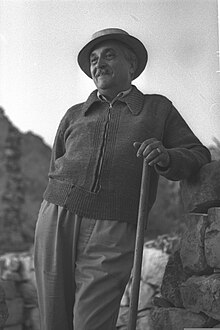Marcel Janco
| Marcel Janco Marcel Hermann Iancu |
|
|---|---|

Janco in 1954
|
|
| Born | May 24, 1895 Bucharest, Romania |
| Died | April 21, 1984 (aged 88) Tel Aviv, Israel |
| Nationality | Romanian, Israeli |
| Education | Federal Institute of Technology, Zurich |
| Known for | oil painting, collage, relief, illustration, found art, linocut, woodcut, watercolor, pastel, costume design, interior design, scenic design, ceramic art, fresco, tapestry |
| Movement | Postimpressionism, Symbolism, Art Nouveau, Cubism, Expressionism, Futurism, Primitivism, Dada, Abstract art, Constructivism, Surrealism, Art Deco, Das Neue Leben, Contimporanul, Criterion, Ofakim Hadashim |
| Awards | |
Marcel Janco (German: [maɐ̯ˈsɛl ˈjaŋko], French: [maʁsɛl ʒɑ̃ko], common rendition of the Romanian name Marcel Hermann Iancupronounced [marˈt͡ʃel ˈherman ˈjaŋku], last name also Ianco, Janko or Jancu; May 24, 1895 – April 21, 1984) was a Romanian and Israeli visual artist, architect and art theorist. He was the co-inventor of Dadaism and a leading exponent of Constructivism in Eastern Europe. In the 1910s, he co-edited, with Ion Vinea and Tristan Tzara, the Romanian art magazine Simbolul. Janco was a practitioner of Art Nouveau, Futurism and Expressionism before contributing his painting and stage design to Tzara's literary Dadaism. He parted with Dada in 1919, when he and painter Hans Arp founded a Constructivist circle, Das Neue Leben.
Reunited with Vinea, he founded Contimporanul, the influential tribune of the Romanian avant-garde, advocating a mix of Constructivism, Futurism and Cubism. At Contimporanul, Janco expounded a "revolutionary" vision of urban planning. He designed some of the most innovative landmarks of downtown Bucharest. He worked in many art forms, including illustration, sculpture and oil painting.
...
Wikipedia
